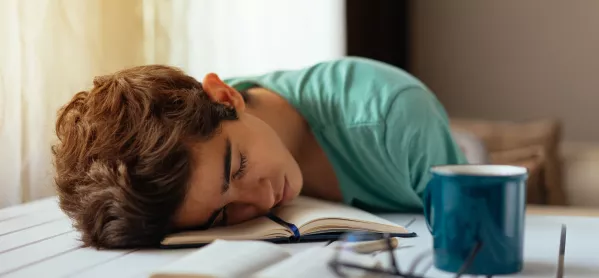Is there a teenage sleep crisis that we need to address in secondary schools, which has been exacerbated by the coronavirus?
I know I certainly can’t be the only one who, in the halcyon days of Tiger King and soda bread starters, was awake at 4am as the sun began to rise on another day of digital teaching and learning - having not yet fallen asleep from the night before.
It is no surprise that the impact the pandemic has had on our sleep routines is extensive, so imagine the impact this has had on our already slumber-deprived teenagers. The same teenagers who we were then trying to engage through computer screens for the full day, many of whom had the option of logging on when they could and completing work at a time that suited them - raise your hand if you had student emails coming through at 1am, anyone?
Research: More than a quarter of pupils not getting enough sleep
Tired students: ‘We need to teach pupils the importance of sleep’
Sleep patterns: How much sleep do teenagers really need?
How to fall asleep at night: 3 tips for teachers
Now, though, as our alarms go off and we are rising to dark mornings and the commute into work for a day of classroom teaching, many of our teenagers are still stuck in the same exhausting cycle: unable to fall asleep at night and reliant on social media to provide a collective consolation from the nightmare of 2020. Then, having to face the inescapable real-life social and hormonal nightmare of being a teenager the next day; of the classroom learning during a pandemic they are being blamed for spreading; and the unpredictable forthcoming exam climate…all on an average of three hours less sleep than they need.
Coronavirus: The impact on students’ sleep patterns
It’s not exactly groundbreaking information that teenagers are always tired. You just need to look at the class of 30 faces you have in front of you at 9am who can barely keep their eyes open.
As a child moves into the early stages of their adolescence, their body clock moves forwards, gradually and slowly, until it’s nearly impossible for them to feel tired before we’re turning the telly off for the night and collapsing into our own beds, yet they still have to get up at the same time as their adult counterparts. They are sleepwalking through school with adolescent jet lag, and the pandemic has made this worse. Should we, as educators, bear this in mind when we are hammering home the importance of deadlines, hand-ins and study timetables, while our teenagers’ circadian rhythms are stuck at 4am during first period?
Mental health concerns
It’s not just their studies it impacts, though. We need sleep to function, to heal, and we need it to be able to process and put to bed the onslaught of information and interactions we encounter every day. The teenage mental health crisis is at breaking point and, with sleep playing a key part in our ability to regulate emotions and make decisions, we can’t afford to press the snooze button on its importance any longer.
Sleep deprivation causes heightened feelings of anxiety and depression, and these feelings are leaving our teenagers (and ourselves) staring at the ceiling, or into the screaming blue light of the social media pages we all know too well. And so the cycle continues: sleepwalking into another day of exhaustion.
So, maybe they’re not lazy. Maybe they’re not hostile. Maybe our students are just absolutely, unequivocally, knackered.
Robyn McLaren is a teacher of English, based in Scotland, and is studying for an MSc in mental health and education

